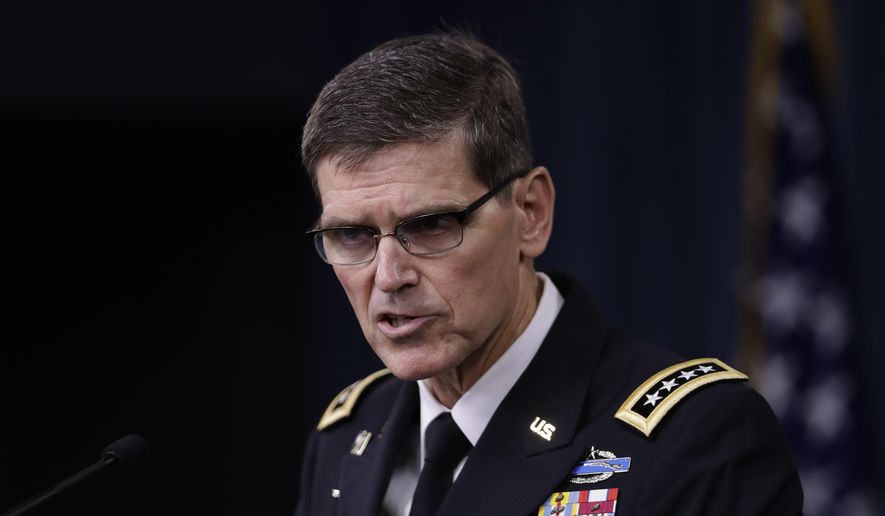The drumbeat in Washington is getting louder over Russia’s purported involvement with Afghanistan’s Taliban.
On Thursday, U.S. Central Command Chief Gen. Joseph Votel became the latest high-ranking U.S. general to accuse Russia of providing weapons and material support to the Islamist group in an effort to expand Moscow’s influence in the war-torn country.
Moscow is also reportedly involved in efforts to restart peace talks between Kabul and the Taliban, without U.S. involvement.
U.S. military officials, including Gen Votel and U.S. European Command chief Gen. Mike Scaparrotti see Russia’s hand in Afghanistan and elsewhere in the region as a way to shore up its borders with the former Soviet republics of Central Asia, just as the White House and Pentagon struggle to develop a long-term strategy for America’s role in the Afghan war.
The issue of Russian engagement with the Taliban, a relationship the Kremlin claims is designed to offset the Islamic State’s growing influence in the country, was front and center during this week’s meeting between Iranian leader Hassan Rouhani and Russian President Vladimir Putin.
“Russia believes that Iran made a fruitful contribution at multilateral talks in Moscow in February by joining the international efforts aimed at the launch of a constructive dialogue between the Afghan government and Taliban militants,” Mr. Putin said this week at a joint press conference between the two leaders in Moscow.
Masoum Stanekzai, chief of Afghanistan’s National Directorate of Security, verified that Russian officials had established direct ties to Taliban leaders. But he told Afghan news outlet TOLO News that the relationship was designed to blunt the rise of Islamic State in eastern Afghanistan.
Supposedly headquartered in eastern Nangarhar province, the Afghan ISIS faction claimed responsibility for a suicide attack against the Afghan military’s main hospital in Kabul earlier this month. Clad in medical garb, the ISIS gunmen killed 30 people and wounded 50 before Afghan security forces ended the siege.
The bilateral talks between Tehran and Moscow come amid efforts by Moscow to facilitate a new round of regional peace talks to end the 16-year Afghan war. Russian diplomats, along with representatives from China, India, Pakistan and other Central Asian powers, are making final preparations for those talks set for April.
Washington declined to participate in the upcoming talks, telling the Associated Press that U.S. officials were not consulted by either Moscow or Kabul on the meeting’s agenda. Taliban representatives were not asked to participate though, the AP reported.
Earlier this week, Gen. Votel told congressional lawmakers that while he was unsure of the full extent of Russia’s involvement with Taliban senior leadership, he did say Russian weapons and support had begun to funnel into the terror group’s coffers.
“I believe what Russia is attempting to do is they are attempting to be an influential party in this part of the world,” Gen. Votel told members of the House Armed Services panel Wednesday.
The top U.S. commander in Afghanistan, Gen. John Nicholson and Gen. Curtis Scaparrotti, head of U.S. European Command and NATO Supreme Allied Commander, both also testified to increased Russian involvement in Afghanistan before Congress in recent weeks.
“I’ve seen the influence of Russia, of late, an increased influence in terms of association and perhaps even supply to the Taliban,” Gen. Scaparrotti told members of the Senate Armed Services panel last week.
But Gen. Votel was quick to note that while U.S. intelligence indicates attempts by Moscow to ally themselves with the Taliban, “there is a lot we do not know about what Russia is doing” in that country.
Russia’s engagement with the Taliban is a defensive measure being taken by Moscow, to offset what regional analysts see as the Trump White House possibly expanding the U.S. military footprint in the country.
“A greater U.S presence creates more fear for Russia; likewise Russia’s growing relations with Afghanistan creates fear for the U.S.,” Afghan political commentator Abdul Shokor Salangi told TOLO News on Thursday.
“But it depends on the ability of the Afghan government as to how it reduces its vulnerability among these tensions and it is related to how we manage Afghanistan’s foreign policy track,” he added.




Please read our comment policy before commenting.